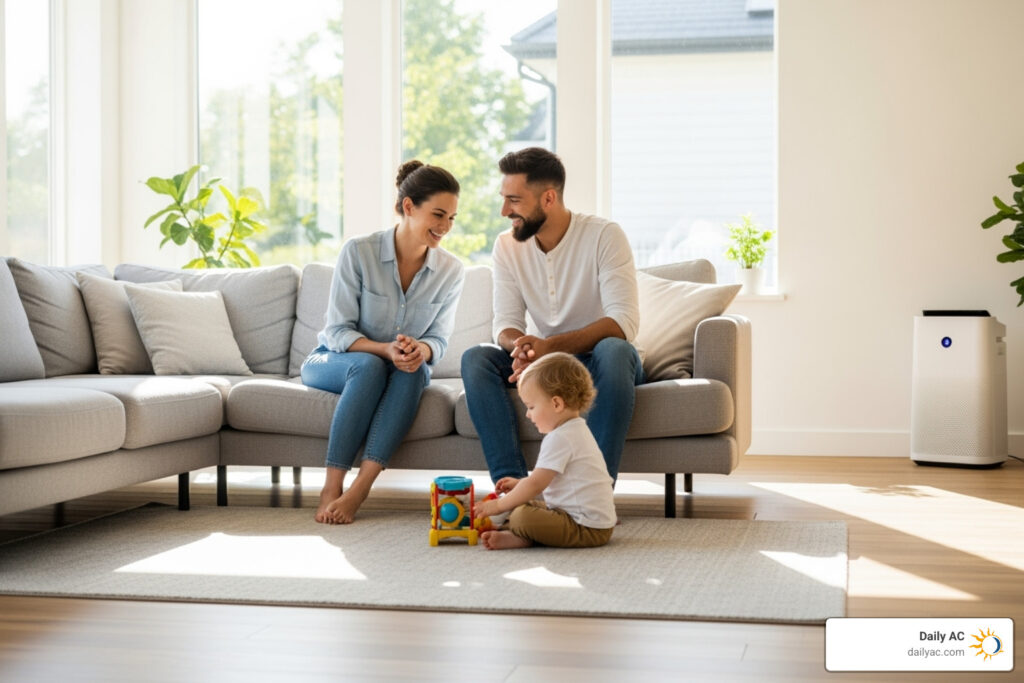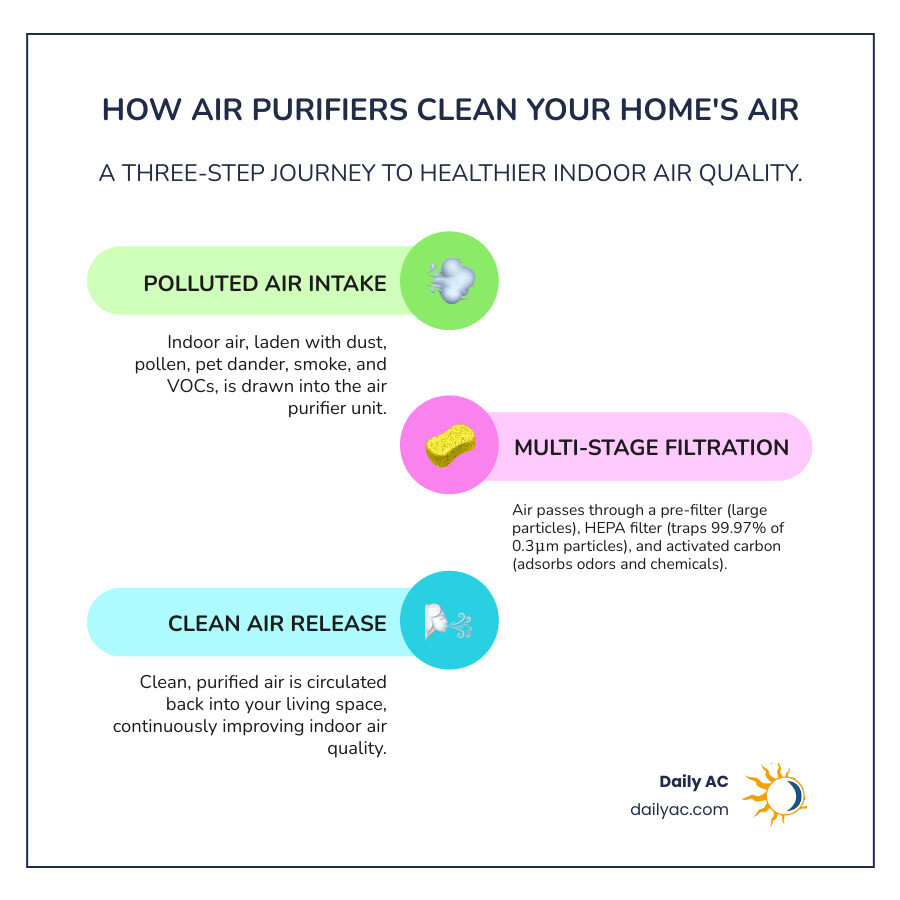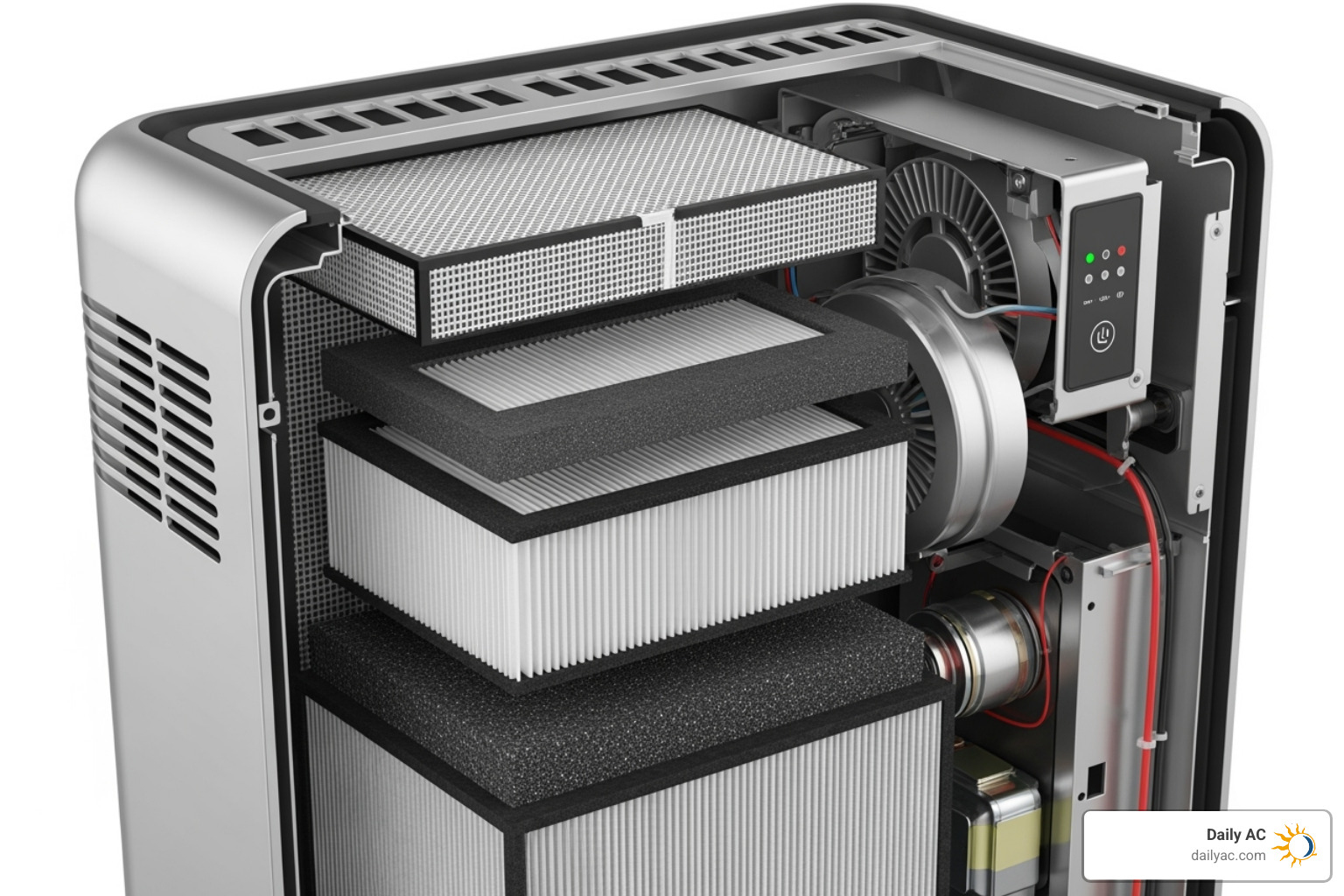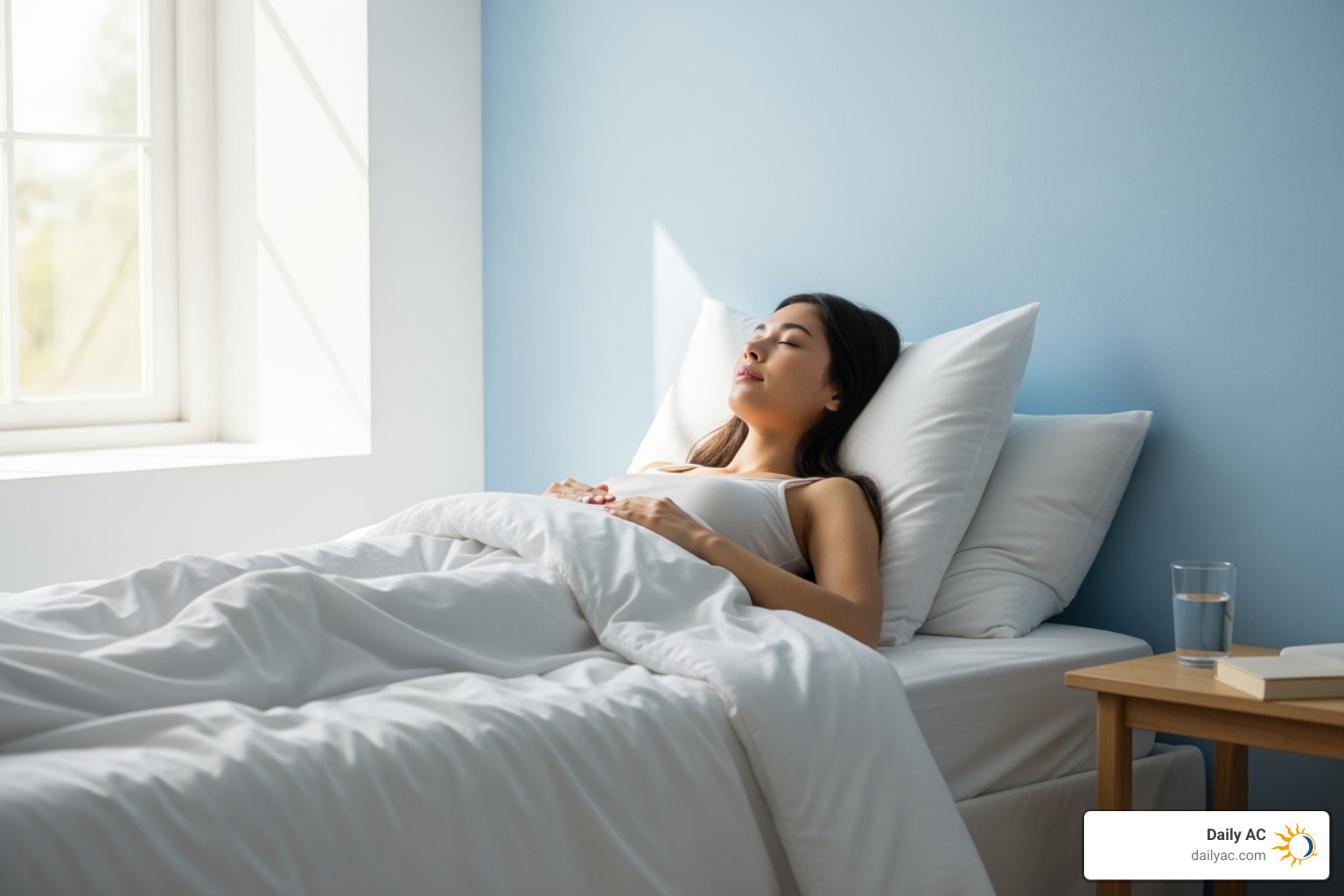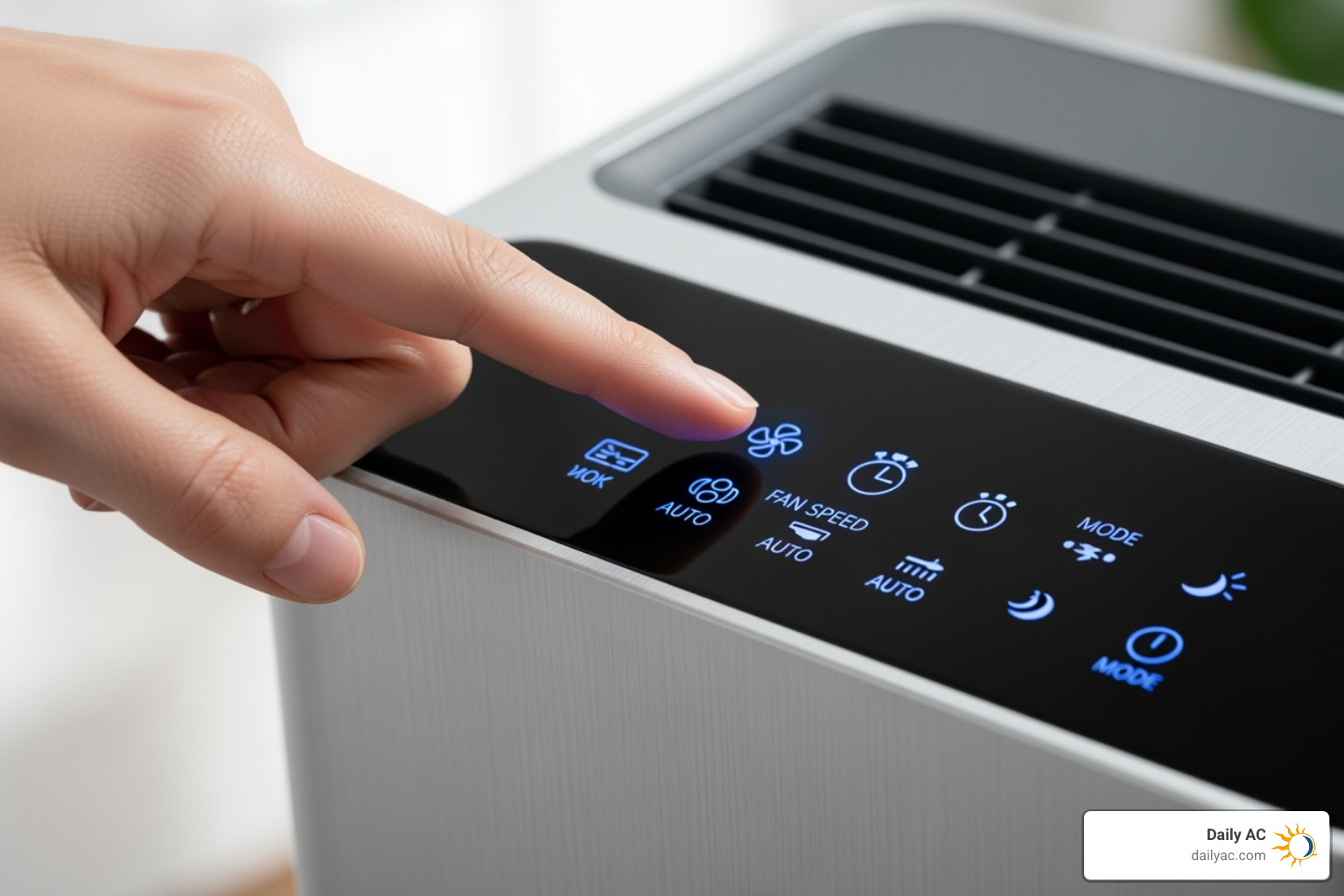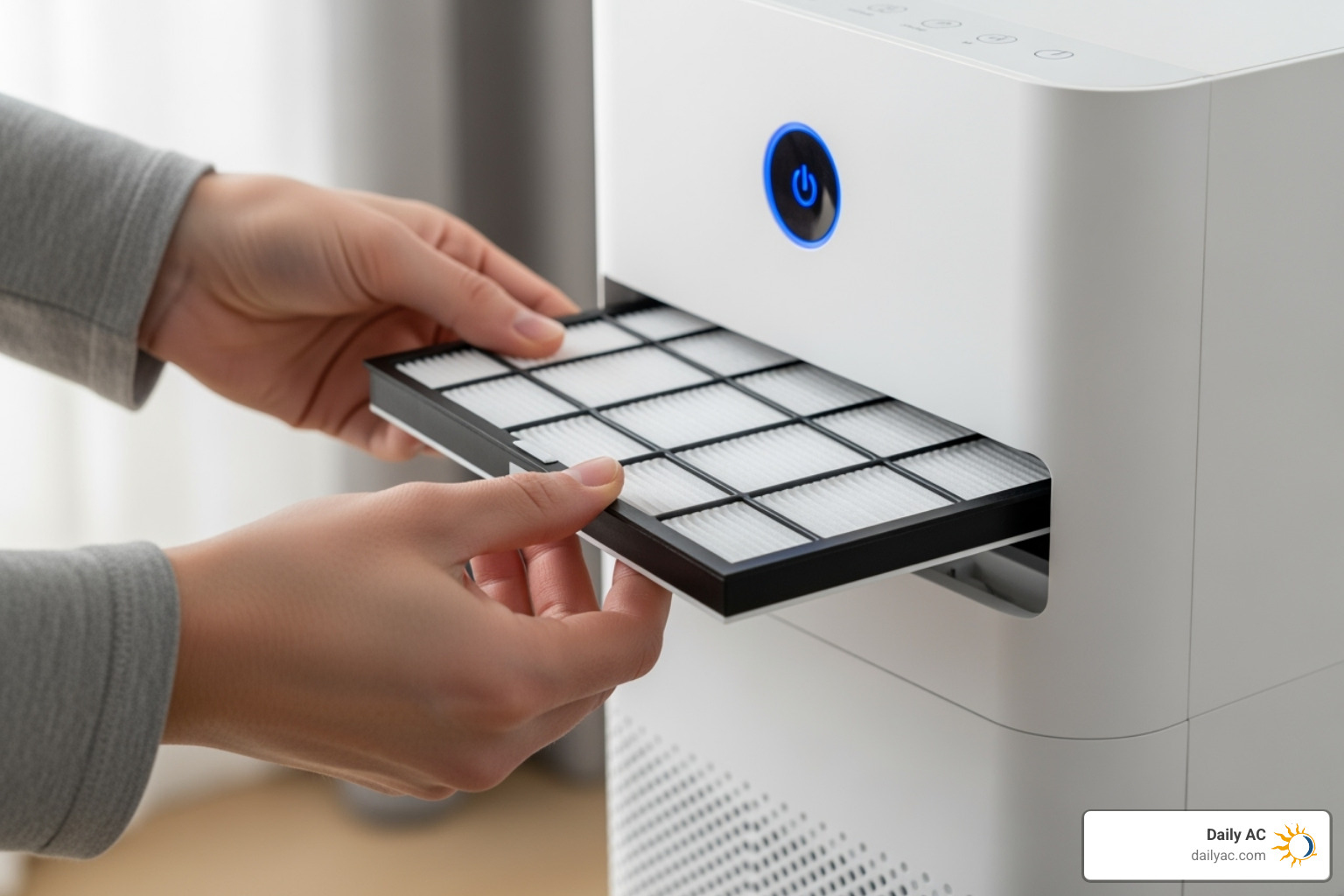Why Clean Indoor Air Matters More Than You Think
Air purification benefits include removing allergens, reducing asthma triggers, neutralizing odors, capturing airborne germs, improving sleep quality, supporting heart health, and enhancing cognitive function. These systems work by continuously filtering pollutants from your home’s air through advanced HEPA and carbon filtration technologies.
Bad air quality can be detrimental to your lung health, but it can be hard to know exactly how bad it is, especially in your own home. Here’s what might surprise you: Americans spend about 90% of their time indoors, yet the concentration of pollutants inside can be 2 to 5 times higher than outdoor air.
Key Air Purification Benefits:
- Allergy Relief – Removes dust, pollen, and pet dander
- Respiratory Health – Reduces asthma triggers and irritants
- Odor Control – Eliminates cooking, pet, and chemical smells
- Germ Protection – Captures bacteria and viruses
- Better Sleep – Reduces nighttime breathing irritants
- Heart Health – Lowers exposure to harmful fine particles
- Mental Clarity – Improves focus by reducing air pollutants
Whether you’re dealing with seasonal allergies, pet odors, or just want cleaner air for your family, understanding these benefits can help you make an informed decision about improving your home’s air quality.
How Air Purifiers Clean the Air You Breathe
Think of an air purifier as your home’s personal air cleaning crew, working around the clock to keep your family breathing easier. The magic happens through a beautifully simple process: a built-in fan draws in the air from your room, passes it through a series of specialized filters, and then releases clean, fresh air back into your space.
This continuous circulation is what makes all the difference. Rather than just masking problems, air purifiers actually reduce the concentration of harmful particles floating around your home. It’s like having an invisible shield protecting your family from airborne irritants, and it’s one of the most effective ways to Improve IAQ for a Healthier Home.
Key Filtration Technologies: HEPA and Activated Carbon
When you’re shopping for an air purifier, you’ll quickly encounter two game-changing technologies: HEPA filters and activated carbon filters. Understanding these isn’t just helpful – it’s essential for getting the air purification benefits you’re looking for.
HEPA filters are the heavy hitters of the air cleaning world. Standing for High-Efficiency Particulate Air, these filters must meet strict standards to earn their name. A true HEPA filter captures 99.97% of particles that are 0.3 microns or larger. To put that in perspective, that’s about 300 times smaller than the width of a human hair!
This incredible efficiency means HEPA filters excel at trapping Particulate Matter (PM2.5) – those tiny particles that can sneak deep into your lungs and cause real health problems. Whether it’s pollen making you sneeze, pet dander triggering allergies, or dust stirring up asthma symptoms, HEPA filters catch them all.
Activated carbon filters tackle a completely different enemy: gases and odors. While HEPA filters are masters at catching solid particles, they can’t do much about that lingering cooking smell or chemical fumes from new furniture. That’s where activated carbon shines.
Through a process called adsorption, these specially treated carbon filters act like tiny magnets for Volatile Organic Compounds (VOCs). These are the invisible gases that drift off everything from cleaning products to fresh paint, and they’re often responsible for those mysterious odors you can’t quite pinpoint.
At Daily AC, we’re proud to offer Air Filtration & HEPA Air Cleaners in Davie, FL because we’ve seen how these technologies transform homes.
What Pollutants Do Air Purifiers Target?
Your home might look spotless, but there’s an invisible world of pollutants floating through your air right now. The good news? Air purifiers are designed to tackle these unwelcome guests head-on.
Dust and dust mites top the list of common culprits. That innocent-looking dust isn’t just dirt – it’s a cocktail of dead skin cells, fabric fibers, pollen, pet dander, and tiny dust mites (both living and deceased). Air purifiers capture these particles before they can settle on your furniture or, worse, in your lungs.
Pet dander is another major player, especially for families with furry friends. These microscopic flakes of skin that pets naturally shed can trigger allergic reactions even in people who think they’re “just sensitive” to animals. Pollen follows close behind, sneaking indoors on clothes, through open windows, or hitching rides on pets.
Mold spores present a more serious concern. While an air purifier can’t eliminate existing mold problems, it excels at capturing airborne spores before they can spread and establish new colonies. Smoke particles from cooking, candles, or outdoor sources are also no match for quality air purifiers.
Perhaps most importantly, many air purifiers can capture bacteria and viruses as they pass through the filtration system. This includes common cold viruses, flu particles, and other airborne pathogens that can make your family sick.
The combination of HEPA and activated carbon filtration creates a comprehensive defense system, ensuring your home’s air stays as clean and healthy as possible.
7 Key Air Purification Benefits for a Healthier Home
Now that we know how these devices work, let’s dive into the fantastic air purification benefits you can experience in your home.
1. Eases Allergy and Asthma Symptoms
For many, the main reason to get an air purifier is relief from allergies and asthma. Waking up with itchy eyes, a runny nose, or persistent sneezing is a common struggle. If these symptoms worsen at night or in the morning, you’re likely reacting to allergens in your home.
Air purifiers are incredibly effective at reducing household allergens like pollen, dust mites, and pet dander. Studies show impressive results: air filters reduced PM levels in children’s bedrooms by an average of 50% and indoor fine particle concentrations by 60%. This significantly lessens triggers for allergy flare-ups and asthma attacks. One study cited that HEPA air purifiers benefit people with varied allergies by reducing indoor allergens, including pollen, house dust-mite (HDM) allergens, and dog dander. This means less sneezing, less coughing, and more comfortable breathing.
In the U.S., 8 out of 10 people are exposed to dust mites, and 6 out of 10 to pet dander. For children with asthma, 30% to 60% are sensitized to dust mites, and their symptoms worsen with exposure. An air purifier gives your respiratory system a much-needed break. You can find extensive scientific research on air filters for allergic respiratory diseases that supports these benefits.
2. Helps Neutralize Unpleasant Odors
Lingering smells from last night’s dinner or a beloved pet can make a home feel less welcoming, even when it’s spotless. This is where the air purification benefits truly shine.
Scent molecules are volatile, meaning they evaporate quickly at room temperature and exist as gases in your indoor air. Traditional cleaning methods might mask these odors temporarily, but they don’t eliminate the source. Air purifiers equipped with activated carbon filters are designed specifically for this task. They adsorb these volatile organic compounds (VOCs) that cause odors, effectively removing them from the air. Whether it’s persistent cooking smells, pet odors from furry friends, the faint scent of tobacco smoke, or even the “new furniture” smell from off-gassing chemicals, a good air purifier can neutralize these unwelcome aromas, leaving your home smelling fresh and clean.
3. Reduces the Spread of Airborne Germs
We’re all more conscious of airborne pathogens. The good news is that air purifiers play a crucial role in reducing the risk of airborne illnesses. How do air purifiers work to improve indoor air quality in this regard? They proactively capture bacteria and trap viruses, preventing them from circulating freely in your home.
HEPA filters are incredibly effective at capturing even microscopic particles, including those that carry viruses. For instance, HEPA filters have been found to capture particles containing COVID-19. While many bacteria and viruses are smaller than 0.3 microns, they often attach themselves to larger dust particles, respiratory droplets, or aerosols, which HEPA filters can readily capture. Some advanced air purifiers, like those with PECO-Filters, can even inactivate viruses like coronavirus and flu strains, going beyond mere capture. One of the first reports in 2022 documented the removal of airborne SARS-CoV-2 concentrations in a hospital environment using combined air filtration and UV sterilization. This means that using an air purifier can actively contribute to lowering your risk of getting sick. For more in-depth information, you can explore research on air filtration and airborne viruses. Additionally, for an extra layer of defense against microscopic invaders, we also offer UV Air Purifiers in Davie, FL that use ultraviolet light to neutralize germs.
4. Promotes More Restful Sleep
A bad night’s sleep can ruin your morning, and poor bedroom air quality can make quality rest feel impossible. Trying to drift off while your respiratory system is irritated by dust, pet dander, or pollen can lead to sneezing, coughing, and congestion that interrupt your sleep.
By continuously filtering out these airborne irritants, air purifiers create a cleaner, healthier sleeping environment. When your airways are clear and free from allergens, you’re less likely to experience the nighttime disruptions that cause restless sleep. Studies have even indicated that lowering air pollution levels can significantly improve sleep quality. Beyond just comfort, cleaner air can also help minimize snoring, as it keeps air passages clearer, allowing for deeper, more restorative sleep. It’s like a gentle lullaby for your lungs, ensuring you wake up feeling refreshed and ready to tackle the day.
5. One of the most significant air purification benefits: Supports Cardiovascular Health
The air we breathe has a profound impact not just on our lungs, but on our entire cardiovascular system. Fine particulate matter (PM2.5), which is easily filtered by air purifiers, can get deep into your lungs and even enter your bloodstream. Once in the bloodstream, these tiny particles can affect almost every biological system, including your heart.
Studies have consistently shown that exposure to particle pollution can negatively impact heart health, increasing the risk of high blood pressure, stroke, heart attack, and heart failure. Even short-term exposure has been linked with increased blood pressure and inflammation. The good news? Air purifiers can make a measurable difference. Research shows that filtration is associated with a 9.4% increase in reactive hyperemia index and a 32.6% decrease in C-reactive protein, both indicators of improved vascular function. Furthermore, air filter use has been associated with a 7.9 mmHg decrease in systolic blood pressure and a 4.5-mm Hg decrease in diastolic blood pressure. A study even found that a PM2.5 reduction of only 5 micrograms (µg/m3) lowered systolic pressure by 3.7mmHg. This makes air purifiers a valuable tool in protecting your long-term cardiovascular health. Dive deeper into this topic with a study on air filtration and cardiovascular health.
6. Another key air purification benefit: Improves Cognitive Function
Did you know that the air quality in your home or office can actually affect your brainpower? Exposure to air pollution has been linked to cognitive effects such as difficulty concentrating, often described as “brain fog.” These effects have even been noticed at pollution levels commonly found in indoor environments, highlighting just how important clean air is for our mental acuity.
A groundbreaking 2021 Harvard research study demonstrated a clear link between air quality and cognitive performance. Researchers observed office workers in urban commercial buildings globally and found that when levels of airborne particles (PM2.5) increased and ventilation decreased, participants took longer to answer test questions and answered them less accurately. This suggests that cleaner air can lead to improved concentration, faster response times, and overall better productivity. By reducing these invisible pollutants, air purifiers help us maintain mental clarity, allowing us to think sharper and be more efficient in our daily tasks.
7. Reduces Dust and the Need for Cleaning
Nobody enjoys dusting, a seemingly endless chore. One of the most tangible and appreciated air purification benefits is a noticeable reduction in household dust.
Dust, as we’ve learned, is a complex concoction of various particles constantly floating in our air. An air purifier acts as a diligent cleaner, continuously capturing these airborne dust particles before they have a chance to settle on your furniture, floors, and surfaces. While it won’t eliminate dusting entirely (because some dust will always be tracked in or settle from larger particles), it will significantly slow down the rate of dust buildup. This means your home will look cleaner for longer, and you’ll spend less time with a dust rag in hand. Imagine the extra time you’ll have for more enjoyable activities!
How to Choose the Right Air Purifier and Use It Effectively
After learning about all the amazing air purification benefits, you might be wondering how to find the perfect unit for your home. Don’t worry – choosing the right air purifier doesn’t have to be overwhelming. With a few key considerations and some smart usage tips, you’ll be breathing cleaner air in no time.
Key Factors in Choosing an Air Purifier
Think of buying an air purifier like finding the perfect pair of shoes – it needs to fit your specific needs perfectly. The most important factor to consider is the CADR (Clean Air Delivery Rate), which tells you exactly how fast your unit can clean the air. This isn’t just marketing fluff; it’s a standardized measurement that shows how quickly the purifier removes tobacco smoke, dust, and pollen from your space.
Here’s a simple rule of thumb: your air purifier’s CADR should equal at least two-thirds of your room’s square footage. So if you’re treating a 12 by 10-foot bedroom (120 square feet), look for a smoke CADR of at least 80. If you’re dealing with challenging situations like wildfire smoke, aim even higher – ideally matching the full square footage of your room.
Room size calculation goes beyond just floor space, though. If your ceilings soar higher than the standard 8 feet, you’ll need a more powerful unit because there’s simply more air to clean. It’s like trying to stir a tall glass versus a short one – more volume means more work.
When it comes to filter types, stick with what works: true HEPA filters for capturing particles and activated carbon filters for tackling gases and odors. Many quality units combine both technologies, giving you comprehensive protection against the full spectrum of indoor pollutants.
Don’t forget about noise level rating – nobody wants a purifier that sounds like a jet engine in their bedroom. Look for the decibel (dB) rating, especially if you plan to run the unit while sleeping. Most modern purifiers offer whisper-quiet “sleep modes” that won’t disturb your rest.
Our team at Daily AC understands that navigating these choices can feel overwhelming, which is why we’re here to help you find the perfect fit with our expertise in Air Purifiers in Davie, FL.
Best Practices for Maximum Effectiveness
Getting the right air purifier is only half the battle – using it correctly is what open ups those incredible air purification benefits we’ve been talking about. Think of your air purifier as a hardworking team member that needs the right conditions to do its best work.
Proper placement makes all the difference. Position your unit in the room where your family spends the most time – typically the living room or bedroom. Give it some breathing room by placing it in an open area, away from walls, furniture, or curtains that could block its airflow. Imagine it as a vacuum cleaner for your air; it needs space to draw in dirty air and release the clean stuff.
For maximum effectiveness, run your purifier continuously, or at least during the hours when you’re in the room. This might seem like overkill, but consistent operation prevents pollutants from building up and ensures you’re always breathing the cleanest air possible. It’s like having a security guard who never takes a break.
When your purifier is working hard, help it out by closing windows and doors. While fresh outdoor air is generally good, keeping your space sealed while the purifier runs prevents new pollutants from sneaking in faster than they can be filtered out. It’s all about creating a controlled environment where your unit can work its magic.
The most crucial step for long-term success is regular filter changes. Over time, those hardworking filters become loaded with all the nasty stuff they’ve captured, which reduces their efficiency and can strain your unit. Most HEPA filters need replacement every 6-12 months, while carbon filters typically need changing every 3-6 months. Always check your manufacturer’s guidelines – they know their product best.
This ongoing maintenance is exactly why we emphasize the importance of professional support. Learn more about Why You Should Consider Air Quality Services to ensure your investment continues delivering clean, healthy air for years to come.
Frequently Asked Questions About Air Purification
We get plenty of questions about air purifiers from homeowners in Davie, Plantation, and Miramar, and honestly, we love answering them! There’s nothing better than helping families understand how to breathe cleaner air at home.
Can an air purifier eliminate all pollutants?
Here’s the straight truth: no air cleaning device can eliminate every single pollutant from your home’s air. We wish we could promise that, but it wouldn’t be honest! What air purifiers excel at is significantly reducing the concentration of airborne pollutants, making your indoor air much cleaner and healthier to breathe.
Think of it this way – air purifiers are fantastic team players, but they work best when they’re part of a bigger game plan. The Environmental Protection Agency actually recommends a three-step approach: first, source control (like not smoking indoors or fixing that leaky pipe), second, ventilation (bringing in fresh outdoor air when it’s clean), and third, air purification.
Here’s something important to remember: air purifiers only clean what’s floating in the air. They can’t tackle pollutants that have already settled on your furniture, floors, or countertops. That’s why regular cleaning and good ventilation are still your best friends for truly clean indoor air. If you’re curious about getting the balance just right, check out our thoughts on Air-Tight Homes and Ventilation.
Will an air purifier help with mold?
Absolutely! Air purifiers can be real game-changers when it comes to mold, but let’s talk about what they can and can’t do. A quality air purifier with a true HEPA filter is excellent at capturing airborne mold spores, which typically measure between 3 and 40 microns. By snatching up these microscopic troublemakers, your air purifier helps prevent spores from spreading throughout your home and can provide real relief if you’re sensitive to mold.
But here’s the catch – and it’s a big one – an air purifier doesn’t eliminate the source of your mold problem. If you’ve got active mold growth somewhere in your home, you absolutely must tackle the moisture issue that’s feeding it. Think of it like this: an air purifier is like having a great security guard who catches intruders, but you still need to fix the broken lock that’s letting them in.
The EPA puts it perfectly: portable air cleaners can remove some airborne mold particles, but they won’t solve the actual mold problem. You’ve got to address that excess moisture and clean up existing mold growth. Your air purifier becomes an awesome sidekick in managing those floating spores, but it can’t be the superhero of the whole operation. Speaking of mold issues, if you’ve noticed some around your AC system, our guide on Why is there mold around AC vents? might shed some light on what’s happening.
How often do I need to change the filters?
Ah, the million-dollar question! We hear this one all the time, and it’s absolutely crucial for keeping those air purification benefits coming strong. The honest answer is “it depends,” but don’t worry – we’ll break it down so it makes perfect sense.
Your manufacturer’s guide should be your starting point – they know their machine best! Many newer models even have handy indicator lights that take the guesswork out of it entirely.
HEPA filters are the workhorses and typically need replacing every 6 to 12 months. But if you’ve got furry family members, someone who smokes, or you live in an area with high pollution, you might need to swap them out more frequently. Activated carbon filters are the odor fighters, and they usually need attention every 3 to 6 months since they can get saturated with all those gases and smells they’re absorbing.
How much you use your air purifier makes a big difference too. Running it continuously on high speed will naturally wear out filters faster than occasional use on a lower setting. And if you’re dealing with challenging conditions – like wildfire season or living near a busy road – those filters are working overtime and will need more frequent changes.
Here’s a pro tip: take a peek at your filters every month or so. If they look discolored, clogged, or just plain dirty, it’s probably time for a change regardless of the timeline. Ignoring filter changes doesn’t just reduce your air purifier’s effectiveness – it can actually strain the motor and cause bigger problems down the road.
Conclusion: Invest in Your Health with Cleaner Indoor Air
The air purification benefits we’ve covered show how cleaner air can reduce allergy and asthma triggers, neutralize odors, limit airborne germs, support heart and brain health, improve sleep, and even cut down on dusting.
We spend about 90% of our time indoors, and indoor air can be 2 to 5 times more polluted than outdoor air. Adding an air purifier is a simple, high-impact way to help your home feel healthier every day.
At Daily A/C INC., we focus on lasting relationships and high-quality service, not volume. We help families in Davie, Plantation, and Miramar, FL create healthier, more comfortable homes with solutions that go beyond temperature control.
Ready to take the next step? Explore our comprehensive air filtration solutions in Davie, FL and start breathing easier.





